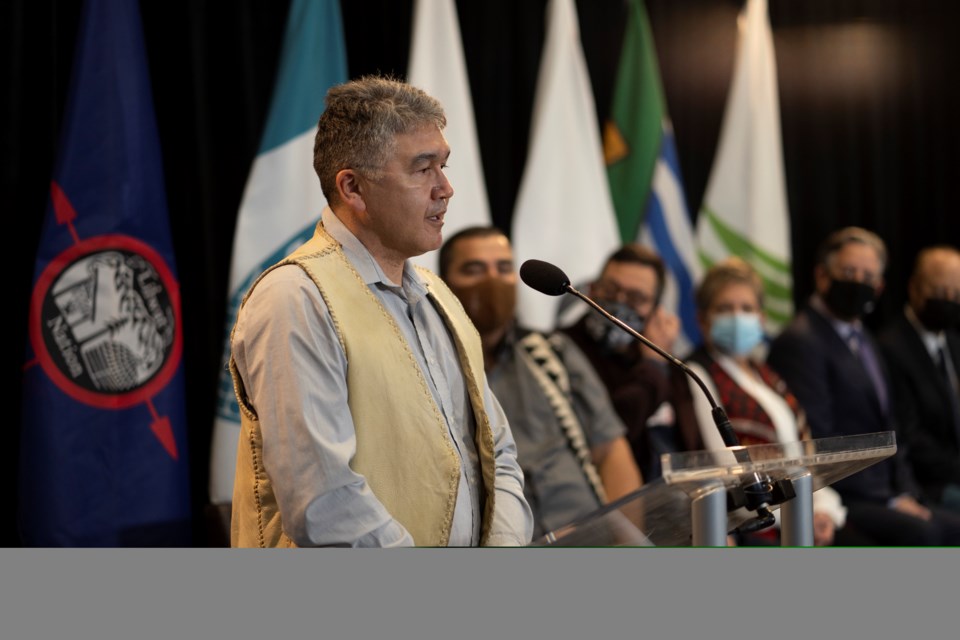Having been part of the Four Host First Nations team during the 2010 Olympic Winter Games, Â鶹Éç¹ú²úNation Councillor Sxwíxwtn (Wilson Williams) remembers the Games well—even if his children were too young at the time to truly experience it.
With the historic announcement on Friday, Dec. 10 that the Squamish, Lil’wat, Musqueam and Tsleil-Waututh First Nations intend to explore a 2030 Olympic bid with the City of Vancouver and Resort Municipality of Whistler, a whole new generation could experience the wonder of the Games.
“When I went home and shared the potential for the Olympics coming in 2030 to my kids, they were over the moon,” Williams said.
The excitement stems from the spirit of sport and competition that comes with the Games, but on a larger scale, “[I told them] this is an opportunity for us to share who we are and where we come from,” Wilson said.
“And they were just ecstatic.”
With the signing of a Memorandum of Understanding, the four Nations and two municipalities plan to explore the feasibility of the first-ever Indigenous-led Olympic Games.
“In reflection, we have been at this place before, with the 2010 Olympics, where we showcased our presence and our cultures, respectively,” said Lil’wat Chief Dean Nelson at the Dec. 10 announcement at the BC Sports Hall of Fame in Vancouver.
“The difference between [now and] 2010 was we were an invitee at that time, and today we are a big part of the exploratory group to consider a bid for the 2030 Olympics.”
Politically, the respective Nations have a greater presence and voice on their lands than they did 10 years ago, Nelson said.
“I also feel we are in a better place of inclusion in respect to political advancements since the previous Olympics,” he said.
“I am looking forward to being part of this. I’m looking forward to the future.”
With the MOU signed, the four Nations and two municipalities will now explore a collaboration agreement, followed by a feasibility study, Wilson said.
“Basically, the big question is how much is it going to cost, [and] who’s paying? So that will be done following the collaboration agreement,” Wilson said.
From there, the parties “will go back to their respective councils and leadership to decide on if this is worthwhile to pledge our support for a bid.”
If all goes well, an official bid could come in the spring or early summer of 2022.
“There are more questions than there are answers right now, and there’s lots of work ahead of us,” said Whistler Mayor Jack Crompton.
“The focus of this group is to understand whether this kind of a project is realistic, achievable and something that we want to get ourselves into.”
One of the big outstanding questions is how much public support there would be for the Games in Whistler and beyond. Survey results released at the end of October by Research Co. showed just 43 per cent of British Columbians would support a bid—down from 60 per cent in January 2020.
“I’m looking forward to hearing from the public,” Crompton said. “A 2030 Games wasn’t high on my priority list, but what is being presented by the Nations, I think, captures the imagination. I’m interested to see if it captures Whistlerites’ imagination the same way it has mine.”
While it’s unclear at this point what form public engagement will take, “we will talk to Whistlerites a lot about this,” Crompton added.
“Our intention is to ensure that we are good partners to the Nations as they lead, and that we listen well to our community as they speak.”
The 2010 Games provided lasting legacies to the resort, through both housing and world-class sporting facilities—but it’s premature to talk about potential benefits to Whistler from a 2030 Games, Crompton said.
“That is what we will be investigating as part of this process,” he said.
“I’m excited to get to work with the assembly on the investigation of 2030, [but] there is very little concrete at this point. There is a huge amount of work to do.”
Still, the concept of hosting a historic, Indigenous-led Games—being framed by the parties as the “Reconciliation Games”—is exciting for those involved.
“Because if it’s First Nations-led, it’s community-led, it will allow us, especially as First Nations through reconciliation, to share our story,” Wilson said.
The “tough stories” that have come out in the past year about the Kamloops Indian Residential School, and other residential schools in Canada, have led to increased dialogue, he added.
“I think people have an eye and ear to really want to learn more—not what was wrong, but I think learning more of the historical events with Indigenous and First Nations people,” Wilson said.
“So I really just feel [the bid] as us getting stronger, especially provincially and in Canada, to really share our story—real story—to the world.
“And the way it’s going to make us stronger is now we are working together, and really trying to make the future a better place for everybody.”




